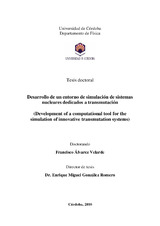Mostrar el registro sencillo del ítem
Desarrollo de un entorno de simulación de sistemas nucleares dedicados a transmutación
| dc.contributor.advisor | González Romero, Enrique Miguel | es_ES |
| dc.contributor.author | Álvarez Velarde, Francisco | es_ES |
| dc.date.accessioned | 2011-03-18T08:10:30Z | |
| dc.date.available | 2011-03-18T08:10:30Z | |
| dc.date.issued | 2011 | |
| dc.identifier.isbn | 978-84-694-1647-1 | |
| dc.identifier.uri | http://hdl.handle.net/10396/4461 | |
| dc.description.abstract | Neutronic and isotopic evolution codes have been extending their capabilities to solve new problems (for instance, the coupling of an accelerator and a subcritical core) related to innovative nuclear systems. These codes are required to be versatile enough to simulate different reactors with very different characteristics. Due to the demand of simulation tools for the description of the real potential of transmutation systems, I have developed, validated and upgraded one tool with these characteristics, called EVOLCODE2, as part of the Nuclear Innovation Program at CIEMAT where I started this job in year 2002. In brief, EVOLCODE2 is a combined neutronics and burn-up evolution simulation tool. It links results obtained by standard codes (such as MCNPX for the neutron transport simulation and ORIGEN2 for depletion calculations), following a methodology based on the physics of the problem. The code is able to estimate a great variety of nuclear reactor parameters; among them, the isotopic composition evolution of the fuel in a nuclear reactor, or criticality constants as function of time. EVOLCODE2 is applicable to nuclear reactors with different neutron spectra, different fuels and mechanical structures, for both critical and subcritical systems. The two main objectives of this Ph. D. are, first, to present this tool, describing its functioning and implementation methodologies, and validating it, and second, analyzing the results it provides for different studies on possible improvements to nuclear energy sustainability using advanced fuel cycles and reactors. The thesis begins with a description of the current state of the global nuclear energy production, highlighting the problems related to the management of nuclear waste, especially the spent fuel. As a complementary possibility for the future, many institutions are nowadays focusing their research efforts in the Partitioning and Transmutation concepts included in advanced fuel cycles. This problematic is described The two main objectives of this Ph. D. are, first, to present this tool, describing its functioning and implementation methodologies, and validating it, and second, analyzing the results it provides for different studies on possible improvements to nuclear energy sustainability using advanced fuel cycles and reactors. The thesis begins with a description of the current state of the global nuclear energy production, highlighting the problems related to the management of nuclear waste, especially the spent fuel. As a complementary possibility for the future, many institutions are nowadays focusing their research efforts in the Partitioning and Transmutation concepts included in advanced fuel cycles. This problematic is described in Chapter 1, showing the global and local relevance of the research in this field and highlighting the necessity of a simulation tool able to deal with the complex studies associated to this research. The second chapter of this Ph. D. contains an analysis of the equations describing the transport and burn-up problems in a nuclear reactor. These equations are the Boltzmann equation for the neutron transport and the Bateman equation for the isotopic evolution. In this Chapter, we will briefly show the methodology to solve this non linear equation system, applying the rationales needed to make the unavoidable approximations. These approximations are geometrical, temporal and due to the limitations in the available computational power. Chapter 3 is devoted to the detailed description of the EVOLCODE2 characteristics, including the implementation of these approximations and an analysis of the achievable accuracy in the estimation of the final results. Once the mathematical and physical background of this code have been described, the programming characteristics of EVOLCODE2 are shown in Chapter 4. The programming style was selected to improve supportability and traceability, using a program structure resulting from the application of object-oriented advanced programming paradigms, such as extensive use of modularisation, abstraction and encapsulation. Code validation against real experiments is essential to trust a simulation tool. Unfortunately, experimental data for burn-up research is usually a restricted proprietary information and it is very difficult to get the rights to use and publish any validated result. However, we finally got access to the results of two different experiments that were used to validate EVOLCODE2. A description of these experiments as well as the results of the validation are discussed in the fifth chapter. The second part of this Ph. D. is the application of EVOLCODE2 to the study of present nuclear problems related to advanced fuel cycles, that demonstrate the real capabilities of the simulation code and provide important results for nuclear energy sustainability that are worth discussing by themselves. In Chapter 6, there is a description of the main international projects where EVOLCODE2 has been used, with special emphasis in the analysis of the capabilities and results provided by the simulation system. The Ph. D. is completed with Chapter 7 for the conclusions, Chapter 8 with prospects for future improvements of EVOLCODE2 and two annexes with details on the basic components of EVOLCODE2 and the physics and models of the neutron spallation process. | en |
| dc.format.mimetype | application/pdf | es_ES |
| dc.language.iso | eng | es_ES |
| dc.publisher | Universidad de Córdoba, Servicio de Publicaciones | es_ES |
| dc.rights | https://creativecommons.org/licenses/by-nc-nd/4.0/ | es_ES |
| dc.subject | EVOLCODE2 | es_ES |
| dc.subject | Herramientas de simulación | es_ES |
| dc.subject | Sistemas nucleares | es_ES |
| dc.subject | Física nuclear | es_ES |
| dc.title | Desarrollo de un entorno de simulación de sistemas nucleares dedicados a transmutación | es_ES |
| dc.type | info:eu-repo/semantics/doctoralThesis | es_ES |
| dc.rights.accessRights | info:eu-repo/semantics/openAccess | es_ES |

